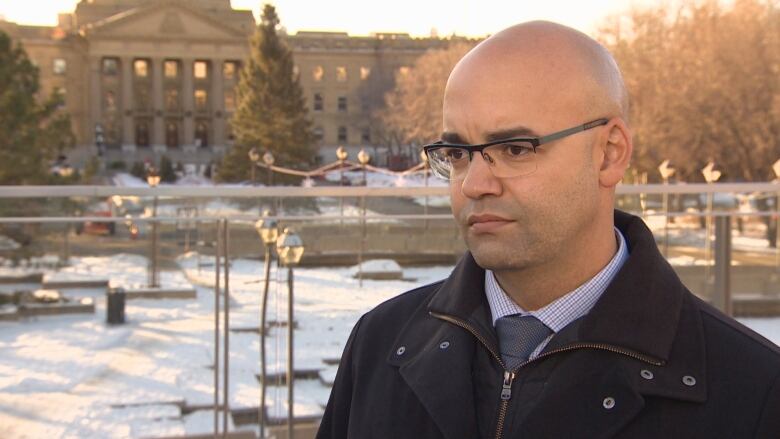Alberta's energy war room says animated Netflix film is 'full of lies' about oil industry
Canadian Energy Centre calls for emails to be sent to streaming giant over Bigfoot Family

The head of the Canadian Energy Centre (CEC) says a recent computer-animated Netflix family film centred on the exploits of the mythical ape-like creature known as Bigfoot depicts "misinformation" and "villainizes energy workers."
The 2020 film, titled Bigfoot Family, sees the eponymous Bigfoot team up with son Adam to protect a wildlife reserve from an oil company in Alaska.
The CEC, sometimes referred to as Alberta's energy "war room," was initially launched by the rulingUnited Conservative Party (UCP) in December 2019, with a stated goal of promoting Alberta oil and gas and countering what it calls misinformation and producing media content.
The government-funded, privately operated initiative launched with an annual budget of $30 million,though that wasreducedwhen the pandemic hit.
In a letter sent to subscribers to CEC's email liston Thursday, the centre said Bigfoot Familywas "full of lies and misinformation." It pointed to one scene in whichoil is extracted by blowing up a valley using "glowing red bombs."
Tom Olsen, the head of the war room, said the CEC responded to the film after a parent flagged it.
"The filmclaimsan oil company intends to usea bombto blow apartamountain landscapewithin a wildlife preserve,thenflood a pristinevalleywith oil. Allwhilelying aboutit," Olsen said in an email to CBC News.
"It villainizes energy workersanddisparages the industry's recordon and commitment to environmental protection."
Olsen said more than 1,000 Canadians have sent emails to Netflix Canada to show their concern, but Netflix Canada did not immediately respond to a request for comment so CBC could not confirm that figure.
The CEC did not immediately respond to a follow-up query from CBCaboutwhat the end goalof the campaign was or a request to interview the parent who had flagged the film.
The provincial government has sought in recent months toattractfilm studiosto produce more movies and TV shows in Alberta, and Netflix, among others, has beenin discussions to increase its presence in the province.
Making headlines
In his email, Olsen said the CEC has worked to provide information about the importance of Alberta's oil and gas industry to Canada's recovery after the pandemic.
"We have promoted Indigenous opportunity provided by the energy sector,environmental gains by industry and consistentlyrelease peer-reviewed research pieces on the reality of fossil fuelsin Canada and around the world," he said.
However, the CEC has also found itself in the headlines for a number of gaffes. Shortly after its launch, the CECsaidit would change its logo after it was revealedthe logoalready representedan American tech company.

Shortly afterward, the Canadian Association of Journalists protested after war room staff referred to themselves as reporters while speaking with sources.
In February 2020, Olsen apologized after the CEC Twitter account sent a series of tweets attacking the New York Times, some of which alleged the Timeshadbeen "called out for anti-Semitism countless times" and "[had]a 'dodgy'track record."
Jared Wesley, an associate professor of political science at the University of Alberta, said attacks like those againstBigfoot Familydrawmore attention to negative stereotypes that people have about the oil and gas industry.
"It may actually end up drawing negative reactionfrom people who are in the middle on this issueand need to be persuaded of a different view on the oilsands," Wesley said.

Wesley said it was difficult to ascertain what the CEC's campaign against Netflix might achieve but if it was an attempt to shame people on the progressive left, it was likely to backfire.
"It feels good to lash out against seemingly progressive or liberal companiesor representations of oil and gas that don't fit with people's positive images of that industry ...but what are the downstream effects of that on the representation of the industry?" Wesley said.
Andrew Leach, associate professor in the Alberta School of Business at the University of Alberta, said the images in the film specifically found to be contentious by the CEC weren't that far off from reality.
"The specific thing they took issue with was the idea that it's unfathomable that there would be a secret campaign to use a bomb to blow up a mountain to flood a valley to fill it with oil," Leach said.
"That was actually pretty darn close to what was once proposed for the oilsands."
On Twitter,Lethbridge NDP MLAShannon Phillips compared the campaign around the Bigfoot Family film to the conservativebacklash over Hasbro's recent decision to removethe gender from the branding of its Mr. Potato Head toy.
"The UCP is divided. They don't have a plan for jobs. Their leader is deeply unpopular," Phillips wrote."So they go to these 'outrage'issues to raise money and find unity. And public money pays for it."
With files from Raffy Boudjikanian












_(720p).jpg)


 OFFICIAL HD MUSIC VIDEO.jpg)
.jpg)



























































































